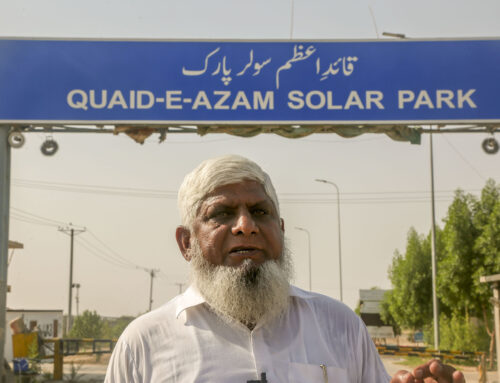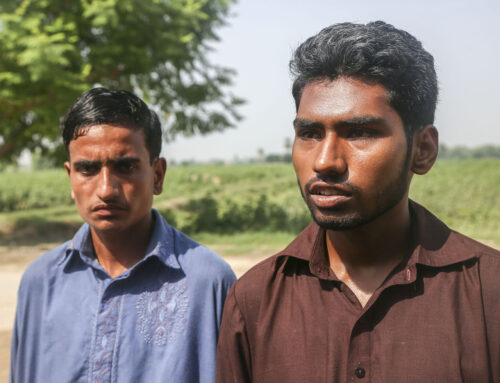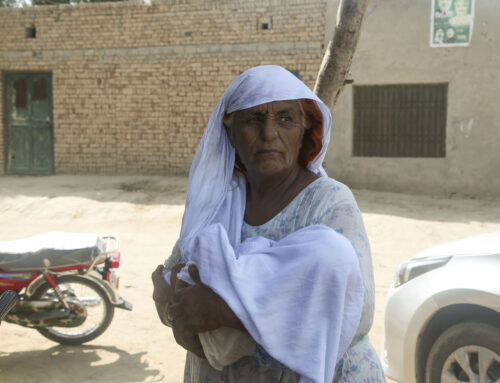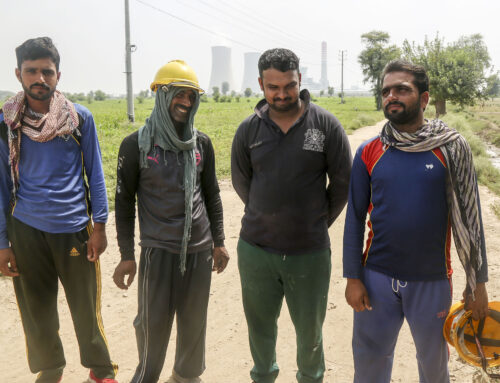“Contrary to our hopes, no development work has been initiated in our village. We lacked a sewerage system, water supply and health facilities. Water turbines have been installed along the canal, where sweet potable subsoil water is available, and supplied to the solar park through a pipeline to meet the needs of the machines [cleaning of solar panels] and its staff.
Muhammad Ilyas
50 years old, runs a small general provisional store in the middle of the village, Chak 30-BC (western). He was interviewed outside his shop.
Writer and Photographer: Aun Ali Jafri
I’m very much glad at the establishment of the solar park. It has helped in drastically reducing power load shedding hours not only in this area, but also in the country. My village, Chak 43-BC (Bahawal Canal) is situated just a couple of miles away from the solar energy project. It’s a backward settlement comprising around 2000 souls.
The project did introduce some prosperity in our village. It proved to be short-lived. Unemployed youths of the village got jobs during the [power plant] construction times. Most of them were hired as laborers and masons. Some of them knew plumbing and electrical work, so they, too, were engaged for work according to their skills. They were all laid off as soon as the construction phase was over. Not a single resident of my village is now employed at the plant. I know this because all types of people come to my shop [a small provisional store] which serves as the gossip corner for the villagers.
Some people say that the plant has led to increase in local temperatures. I don’t believe them. There seems no links between the two. How could it when no fuel like coal, gas or oil is being used whose burning could make the surroundings hotter? TV channels daily report that temperatures are on the rise all over the world. So, it’s not a phenomenon specific to Cholistan only. It may be a mere coincidence that the area temperature began to go up when the solar project was executed. Solar is not a dirty energy plant like the coal fired ones.
Me and other villagers are also happy that the project became a source for mitigating our transportation blues. The village situated on the western side of the Bahawal Canal didn’t have a direct access to any pukka [carpeted] road nor any bridge on the canal nearby. We had to travel long hours on mud roads to find a bridge for crossing the canal and to reach urban centers to meet our needs like purchasing groceries, farm inputs, visiting doctors and obtaining medicines from drug stores there. We had to take great pains in shifting patients from the village to city hospitals. Sending our children to higher educational institutions in the city, for there was only up to 10th grade education available in the village, was only a dream for us.
The road built for linking the solar park with the cities also provided us the missing connectivity. Our movement to and from Bahawalpur has become much easier for all purposes. Some of us, who can afford it, have begun sending their children to schools in the city in search of quality education.
I have no deep knowledge about China other than reading and hearing about stories of Silk Route and the Great China Wall since my childhood. I, myself, am an eighth grader and not highly educated. What I learn from the people and TV (talk shows) is that China is the best time-tested friend of Pakistan. The friendship between the two countries is strengthening with the passage of time. They say China is friendlier towards third world countries than the United States and other big powers and, unlike the Western powers, she does not impose her decisions on other countries. They also say that CPEC (China-Pakistan Economic Corridor) is an example of the special ties between the two neighbors that will benefit people of both the countries.
Chinese engineers working at the plant has never visited my village. Even Pakistani staff seldom appears here. I don’t remember if they had ever purchased anything from my store. By the way, unlike other industrial units, the solar park has not generated direct business activities or improved the already established shops in the area. Because, there are canteens and other stores right within the park for the employees, supplies for them come direct from the nearby town(s). So, no positive business impact on my or other’s businesses.
Contrary to our hopes, no development work has been initiated in our village. We lacked a sewerage system, water supply and health facilities. Water turbines have been installed along the canal, where sweet potable subsoil water is available, and supplied to the solar park through a pipeline to meet the needs of the machines [cleaning of solar panels] and its staff. Can’t we have some share in the water supplies as most of underground water in the village is sour? Can’t we?




